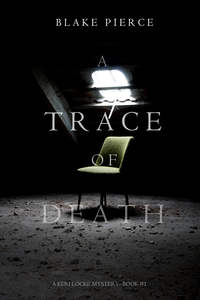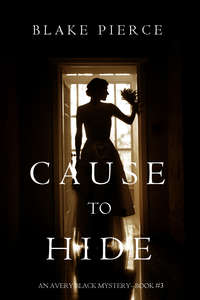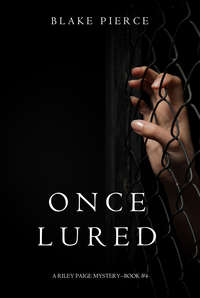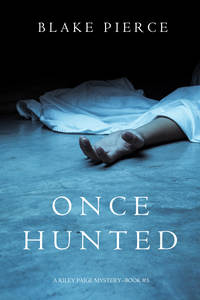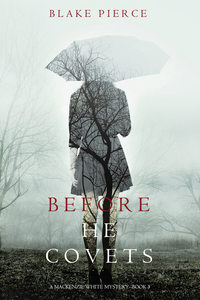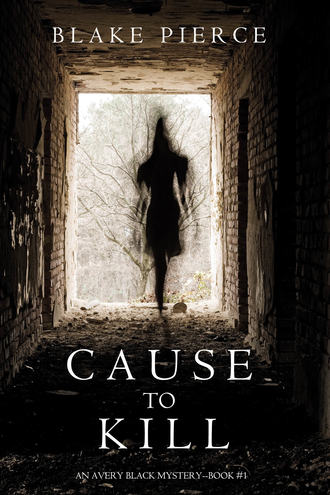 полная версия
полная версияCause to Kill
“Made a left on Unity Avenue now,” Finley called.
The line of police turned right on Marlboro and then made a quick left.
“We stopped. We stopped,” Finley cried. “I’m out of the car. Mustang on the lawn of a small brown house, left side. Heading into the house.”
“Don’t go into the house!” Avery shouted. “Do you hear me? Do not go in!”
The line went silent.
“Shit,” she said aloud.
All the police cars had converged on a single brown two-story house with a short lawn and no trees. The Mustang had nearly smashed into the front staircase. The police cruiser beside it, Avery assumed, had been the one with Finley inside.
Avery hopped out and pulled the Glock out from her shoulder strap. Other officers had their weapons drawn. No one seemed to know what was happening.
“Is this our guy?” Henley called out.
“We don’t know,” another cop answered.
Yelling came inside.
Shots were fired.
“You two!” Henley roared to his men. “Go around back. Make sure no one leaves. Sullivan, Temple, keep your eyes on me.”
He squat-ran up the stairs and into the house.
Avery made a move to go after him.
“Hold up. Hold up,” a cop shouted.
Finley exited the house with his arms wide in pleasant victory, gun in hand.
“That’s right,” he said. “Game over for the serial killer.”
“Finley, what happened?” Avery shouted.
“I got him,” he declared, no sense of remorse or social etiquette. “Shot that mother-fucker. He pulled a weapon and I shot him. Saved some cop’s life and shot his white ass. That’s how we do it on the south side,” he declared and threw up a gang symbol Avery immediately recognized as the South Boston D-Street Boys.
“Slow down,” she said. “How do you know he’s our guy?”
Finley cocked his neck and opened his eyes wide.
“Oh yeah,” he declared, “That’s our guy all right. Caught him in the basement. Lot of sick shit down there. You gotta see it to believe it.”
Henley came out of the house.
“Sullivan,” he called, “get an ambulance out here, now, and get down in that basement. Dickers was shot. He needs support. Travers,” he said, “I want this place sealed off. No one in. No one out. You hear me? We don’t need anyone else contaminating the scene. Marley! Spade” he yelled to the back. “Get out here.”
“I need to see what’s in there,” Avery said.
“Go,” Henley waved, “she’s OK, Travers. Both of them,” he indicated Finley. “No one else.” And to Finley he added: “I’m going to need a statement from you, young man.”
“No problem,” Finley said. “Heroes tell tales.”
“Tell me everything, slowly,” Avery snapped.
Finley – still on an adrenaline rush – was hyped and bouncy.
“I did what you asked,” he said in his speedy, accented tone, “wrote down those tombstone names. A bunch of girls, maybe eighteen or twenty years old. I don’t know. I’m no good at math. Died in WWII. Then I saw this old guy watching everything from afar. Looked shady, you know? I alerted one of the other cops, because I’m a team player and all, and we went over to have a little chat. We get about halfway toward this guy and he bolts: hard run to the car. Who knew old people could run so fast? Jumps in and peels out. Wait until you see what we found. Solved the case single-handedly,” he said and slapped his chest. “Don’t worry. I’ll give you some props,” he added. “Who’s lazy now?!” he yelled to the sky.
All Avery heard was “tombstones…girls…died in WWII…” and she made a mental note to find out everything about those markers and the women they served.
Gun drawn, Avery moved through the front door.
The house had an old, musty scent to it, like someone hadn’t lived there in a long time. Carpets were dusty white. A staircase led to the second floor. Through the ceiling, Avery heard footsteps and someone yell, “Clear.”
“Down this way,” Finley said.
He led her around the stairs. A kitchen was on the left. To the right was a door that led to the basement. The scent was strong around the door: rotting corpses and scented oils. Oils, Avery thought; maybe this is our guy.
Creaky steps led to an expansive, dark basement with a stone floor. The smell was so strong Avery nearly retched: dead bodies and decomposition mixed with sweet-smelling fragrances to hide the scent. Air fresheners hung everywhere between the beams and exposed padding of the ceiling. Boxes lined nearly every wall, hundreds and hundreds of boxes. The only empty space held a long table marred with dried blood and cutting implements
Towards the back was a soiled bed.
A dead body lay on the bed, practically blue and decomposed from time, legs splayed open and tied to posts, along with the hands. It was a girl, someone young that Avery guessed had died years earlier.
Strange, sexual devices surrounded the area: bondage chairs; chains from the ceiling, and a swing. One of the boxes in the back was opened. Avery peeked inside and caught a glimpse of a woman’s body parts.
She held her nose from the stench.
“Jesus.”
“What did I tell you?” Finley beamed. “Crazy shit, right?”
A man lay dead at the foot of the wooden-post bed, 6’2” or 6’3”. He was old and lean, with long gray hair. Maybe sixty, Avery thought. A shotgun was by his hand.
The downed cop sat against a side wall being aided by his friend. Luckily, he’d worn a vest, but some of the shotgun shells had gone through his neck and face.
“My wife’s going to fucking kill me,” the cop said.
“Nah,” the other cop replied, “you’re a hero.”
The basement was dirty. Dust balls were everywhere. The tools on the desk, the desk itself, even the sex equipment had obviously never received a thorough cleaning. Boxes along the back were soiled and nearly falling over.
“I need to make a sweep,” Avery said. “Finley. Check the garage. See if you can find our blue minivan, and disguises, plants, needles: anything related to our case.”
“On it,” he said and bounded up the stairs.
The rest of the house appeared old and unlived in, with no pets and no plants. It was neat, tidier than the basement, but still caked in dust. No indication of any other perversions could be found on the higher floors. Pictures that lined the walls were quaint copies of artists like Bruegel and Monet. The suspect, it seemed, spent most of his time on the second floor, where Avery found his personal effects and clothing.
She headed outside.
The neighborhood had come alive. Police lights still turned. Crowds had gathered around the areas sectioned-off area.
Finley came panting back.
“Just an empty garage with a lot of junk lying around,” he said.
A picture of the killer had already taken shape in Avery’s mind, based off what she’d seen on the surveillance tapes and what she believed from previous experience. She imagined a strong, dainty young man – educated and anti-social, a man that liked art and had a mind for medicinal concoctions. The way he placed his women were like Parish paintings, or works by Alphonse Mucha. Similarly, the drugs he administered were artlike in their own way, drawn from a number of rare, illegal plants and flowers. He was also fastidious about details, and clean, just like the placed bodies with their washed clothing and clean skin.
This house?
The man dead in the basement?
George Fine?
They were all pieces of the puzzle, but they felt like different puzzles, with their own pieces, and all the pieces were strewn together.
CHAPTER SIXTEEN
The police department stood on their feet when Avery and Finley appeared from the elevator banks. Finley basked in the attention. He bowed, hooted at his friends, and repeatedly yelled: “I’m the man, right? You see how we do it on the South Side?”
“Great job.” People clapped.
“You got him!”
In a dark place, Avery heard none of it. The office was a shell with no one inside, the sounds: white noise. Images swirled in her mind: George Fine, Winston Graves, and the old dead man in his sick, twisted basement of horrors.
O’Malley came out of his office to personally shake Avery’s hand.
“Talk to me,” he said. “How did it go?”
“Guy’s name is Larry Kapalnapick. Works at Home Depot as a loader,” Avery said. “From the looks of it, all the bodies in the basement were already dead.”
“Fuckin’ grave digger!” Finley chimed in.
“He must have been doing it for years,” Avery said. “Watertown police estimated there were body parts from at least twenty different people down there. Best guess is, he digs up a body, plays around for a while, and then cuts it up and stores it in the basement. Henley’s department is having everything shipped to the lab just to make sure.”
“Son of a bitch,” O’Malley whispered.
Finley laughed.
“Motherfucker had Pine Scents hanging all over the basement ceiling.”
“What about our victim?”
“We went back to the scene after the chase. Coroner was there and forensics. Randy says it was the same perpetrator as Cindy Jenkins, same MO, and from the smell of it, probably the same anesthetic. She’ll check into that here.”
“So, Fine isn’t our guy.”
“Can’t be,” she said. “He was locked up tight the night before. He’s guilty of something. But not this. As a precaution, I asked Thompson and Jones to check out the cabin in Quincy Bay. Then Jones will continue street surveillance for the minivan, and Thompson has been assigned to dig up everything he can on Winston Graves.”
“Graves? Jenkins’ boyfriend.”
“It’s a long shot,” Avery admitted. “In the meantime, Finley takes over on the Tabitha Mitchell case. He can start now with friends and family.”
“Finley?”
“He worked his ass off today.”
To Finley she added: “Remember to think beyond Tabitha Mitchell. We need any connections between her and Cindy Jenkins. Childhood history. College majors. Favorite foods. After-school activities. Friends and family. Anything.”
With a fire in his eyes, Finley banged on his heart.
“I’m your pit bull,” he said.
The captain nodded at her.
“What are you going to do?”
Avery imagined the blue minivan heading west from Boston. She believed the killer had to reside in one of the counties that followed: Cambridge, Watertown, or Belmont. The combined populations of those counties totaled almost two hundred thousand. An endless sea of faces.
“I need to think,” she said.
* * *Avery sited her Glock 27 at a distant target. Orange goggles covered her eyes. Plugs had been stuffed into her ears. She imagined the face of Howard Randall as a placeholder for the new, faceless killer. She fired.
Pop! Pop! Pop!
Three shots hit the target almost dead center.
Thinking had always been her strong suit: time away from a case when she could decompress and process what she knew.
A blank wall greeted her this time.
No leads. No connections. Just a wall that kept her away from the truth. Avery had never believed walls. Walls were for other people, other attorneys, other cops that simply didn’t know how to break through those walls and see what others couldn’t.
What am I missing?
Pop! Pop! Pop!
Her bullets faded to the right. At the start of her session, she’d hit nothing but bull’s eyes. Now they were off. Just like you, she thought. Off. Missing the target. Missing something.
No, she mentally rallied.
Breathe in…breathe out…
Pop! Pop! Pop!
All bull’s eyes.
Howard Randall, she thought.
Suddenly, she realized: That’s it. A fresh perspective.
Stupid, she thought. Crazy. Connelly would go nuts. The media would have a field day. Fuck the media. Would he even do it? Of course he would; she knew for certain. He went to jail for you. He has this sick fascination about you. He’s probably following the case already. No, she swore. I won’t do it. I won’t go down that road again.
She put in a fresh clip in her gun.
She fired.
Pop! Pop! Pop!
Every shot went wide.
* * *In the darkness of the police station, well past midnight, Avery sat hunched over her desk. Pictures lay spread out before her: Cindy Jenkins, Tabitha Mitchell, Lederman Park, the cemetery, and the alleyway and screenshots of the minivan and the killer.
What am I missing?
Photos were meticulously analyzed.
Finley had already taken a few sworn statements. From the early looks of it, Tabitha had been abducted right out in the open, just like Cindy, probably only steps away from the bar she visited every Tuesday night. Only, there was no boyfriend or frequent stalker to question. According to those interviewed, Tabitha had been single for a while. Tabitha was in a sorority – Sigma Kappa – but the connections to Cindy Jenkins ended there. Tabitha was a junior economics major. Cindy was a senior in accounting.
Sororities.
Is that the link?
She made a mental note to check nationwide sorority gatherings.
The movie playing at the Omni was about three women. The gravestone pointed to three women. Does that mean he kills in threes? The movie and the WWII tombstone girls were compared and contrasted for any leads.
She surveyed multiple car routes around Cambridge and Watertown and imagined where the killer might live, and why he might have chosen those routes. The list of dark blue Chryslers was now being supervised by Finley. They already had two thousand listed with owners for cars made and sold in the past five years. What if he bought it six years ago? she thought. Or seven?
Howard Randall continued to invade her thoughts. She even imagined she heard his voice: “You can come to me, Avery. I won’t bite. Ask me your questions. Let me help you. I’ve always wanted to help.”
She banged on her head.
“Go away!”
Still, the image came, and laughed.
CHAPTER SEVENTEEN
At seven-thirty the next morning, Avery sat in her car a half block down from the home of Constance and Donald Prince.
They lived in Somerville, just northeast of Cambridge, in a small yellow house with white trim on a quiet suburban street. A white picket fence surrounded the property. There were two porches: one on the first floor up, and another on the second level, where chairs and a table had been set for sunlit morning breakfasts.
The scene appeared to be the perfect setting: trees lined the sidewalks, the sun was coming up, and birds chirped in the sky.
Screams were all Avery could remember, the endless screams from the one and only time she had visited the Princes, and tears and plates being thrown against the wall as both of them had desperately tried to drive her away.
Constance and Donald Prince were the parents of Jenna Prince, the last Harvard student killed by Professor Howard Randall, nearly four years ago. The murder had come only weeks after superstar defense attorney Avery Black had done the impossible and gotten Professor Randall off for the murder of two other Harvard students, despite the overwhelming circumstantial evidence stacked against him.
Those brief few days between Avery’s jury win and the killing of Jenna Prince resounded in Avery’s mind. At the jury verdict, the celebration had begun. Nights were spent downing expensive bottles of wine and sharing her bed with numerous, nameless faces. One night in particular, she’d even called her ex to ask if he wanted to get back together again. She never even waited for a response. Avery had just laughed after her question and swore she’d never be with a loser like him again. The shame she felt over that moment continued to burn on her cheeks even now, years later.
Her victory had been short-lived.
She learned the truth from the papers a few days later: “Freed Harvard Killer Strikes Again.” Like his previous victims, the many body parts of Jenna Prince had been carefully reconfigured near Harvard landmarks. But unlike the other murders, this time, Howard Randall had immediately stepped forward. He appeared in Harvard Yard almost as soon as the body was discovered, hands up in surrender and covered in blood. “This is for you, Avery Black,” he had told reporters. “This is for your freedom.”
And her belief that she was a decent, honorable person? That she’d finally done good and freed an innocent man?
Gone.
Everything she believed in was destroyed. Her husband had always known the truth about her faulty overconfidence and ego, but her daughter? It was a shocking revelation. “Was it all about the money?” Rose had wondered. “You set a serial killer free. How many other murderers have you let off so you could wear those shoes?”
Avery glanced at the tan interior of her BMW.
The leather was faded and old. The black dashboard had been removed and updated with her transreceiver, police scanner, and a computer for when she was on stakeouts. The car, bought at the height of her arrogance and fame, now served as a memory of her indulgent past, and a testament to her future.
“You won’t die in vain,” she swore to the memory of Jenna Prince. “I promise.”
The walk to the house felt like forever. The sound of her shoes on the cement, birds, distant cars, and noises all made her more aware of herself, and what she intended to do. “I hate you,” Constance had spit all those years ago. “You’re the devil. You’re worse than the devil.” “Get out of our house!” Donald had cried. “You already killed our daughter. What more do you want? Forgiveness? Who can ever forgive someone as sick and depraved as you?”
Avery walked up the steps.
A phone call would have been inappropriate, even more so than an impromptu visit. They needed to see her face, her desperation. And she needed them.
She rang the doorbell.
A middle-aged female voice cried out: “Who is it?”
Footsteps moved closer.
The door opened.
Constance Prince was white, with an unnatural tan and cropped, bleached-blond hair. Although she rarely left the house except for chores or Mahjong with friends, she had on a mask of heavy make-up: blush, eyeliner, and red lipstick. Wrinkles lined her mouth and eyes. She wore a light sweater and red slacks. Golden bracelets clinked on her wrists. Jewels hung from golden threads on both ears.
A few blinks and she seemed to focus in on Avery. The welcoming air of her posture and appearance quickly faded. A breath was sucked in and she stepped back as if in shock.
Another voice called out.
“Who is it, honey?”
Without a word, Constance tried to shut the door.
“Please,” Avery said. “I just need to ask a favor. I’ll be gone before you know it.”
A sliver of Constance’s face could be seen between the door and frame. Head low, she stood unmoving for a moment.
“Please,” Avery begged. “I need something, but I can’t do it without your approval.”
“What do you want?” Constance whispered.
Avery searched the porch and street before she turned back to the door.
“Have you read the papers?”
“Yes.”
“There’s another killer on the loose. He’s a lot like, the last one,” Avery said without mentioning Howard Randall, “smart and hard to track. Another body was found, today. That makes two so far, but he might work in threes, which means another body isn’t far off. I’m a cop now,” she added. “That life, who I was back then, that’s not who I am now. I’m trying to make amends. I’m trying to be different.”
The door opened.
Donald Prince had replaced his wife. Older, extremely large and out of shape, he had short gray hair, reddish skin, and a look that spoke to his shock and fury. He wore a dirty T-shirt, shorts, and green clogs. A dirt-covered glove was over one of his hands.
“What the hell do you want?” he said. “Why are you here?” He looked down the street. “You’re not welcome in this house. Haven’t you done enough to our family?”
“I came to get your permission,” she said.
“Permission?” he spit and almost laughed. “You don’t need our permission for anything. We want you out of our lives! You killed our daughter. Don’t you understand that?”
“I never killed your daughter.”
His eyes widened.
“You think that excuses what you did?”
“What I did was wrong,” she said, “and I have to live with that – every day. I’m different now. I’m a cop. I try to right these wrongs, not allow them to go free.”
“Well, good for you.” He aggressively nodded. “Too little, too late for us, though. Isn’t it?”
He tried to close the door.
“Wait,” Avery said.
She held a palm on the painted wood.
“There’s a new killer. Just like Howard Randall. Right in our backyard. He’ll kill again. I’m sure of it. And soon. My leads are cold. I need a fresh perspective. I need to go visit Howard, see if he can help. I want your permission.”
A laugh came from inside.
The door opened.
Donald leaned back, impervious.
“You want my permission?” he said. “To talk to the killer of my daughter, so you can stop another killer?”
“That’s right.”
“Sure,” he said with a fake smile. “Good luck.”
Any familiarity left his face, and a dark, murderous glare penetrated Avery.
“I don’t care who you are now. You hear me? You come to my house again? You talk to my wife?” Violence burned in his eyes. His voice turned into a whisper. “I’ll kill you,” he swore. “And that will be justice. True justice.”
CHAPTER EIGHTEEN
South Bay House of Corrections was a tremendous brown complex that spanned over six square blocks in the South End of Boston. The fortress was laid out in the shape of a triangle, with few windows and even fewer ways to enter. Multiple smaller buildings, high walls, and endless gates around the property made its entrance an enigma to the average visitor.
Avery had been to South Bay a few times before, both as an attorney and a cop. Even though it was easy for her to navigate Massachusetts Avenue to the number of side streets that needed to be utilized in order to park on Bradson Street and gain access to the main building, it was always a time-consuming and overly complicated process.
Visitors normally had to give written permission to enter at least a day in advance. If no advanced warning was given, they were usually turned away at the door for security reasons, regardless of their name, position, or excuse. The fact that Avery was a cop meant little to the overseers at South Bay. Prisons were like private islands, states unto themselves where employees were only accountable to their warden and the major.
Avery, however, wasn’t a typical visitor.
A pseudo-celebrity at South Bay, she was known by nearly everyone on staff. The trial where she had Howard Randall acquitted of murder had been televised. What had also been televised was his bloody surrender only days later. During both ordeals, her face had been plastered everywhere, and until her disappearance and eventual reemergence in the Boston PD, her name had become synonymous with corrupt lawyers and a legal system in need of a massive overhaul.
At the metal detector, a guard shouted.
“Hey, Ms. Black. Check it out, Joey! Look who’s here. Avery Black is back.”
“What’s up, Ms. Black?”
Avery offered a limp wave.
“Hi, guys.”
She placed her items on the table and moved through the scanner.
Another guard bowed.
“To what do we owe this honor, Ms. Black?”
“I’m here to see Howard Randall.”
“Oh!” a bunch of guards cooed.
“Wish I was a fly on that wall,” someone said. “Careful, Black. Randall got moved to B-Block two months ago. He carved up an inmate pretty-bad. That old man can move!”
After the metal detectors, she was frisked and allowed to move into the visitors’ room.
“Name?” said a chubby, dour woman inside a gated office.
“Avery Black. Homicide. Boston PD.”
“I don’t see you on our list, Black. You’ll have to come back another time.”
A passing guard made a face.
“Nah, nah,” he said, “let her through. Do you know who this is? Avery Black. Got that crazy old geezer Randall off for murder. Most riveting case I ever watched.”
“You’ll take the heat?”
“Yeah, yeah. Give her a pass. I’ll get someone down to Randall. See if he’s up for a chat. Sorry, Ms. Black, but if Randall don’t want to see you, there’s nothing we can do.”




